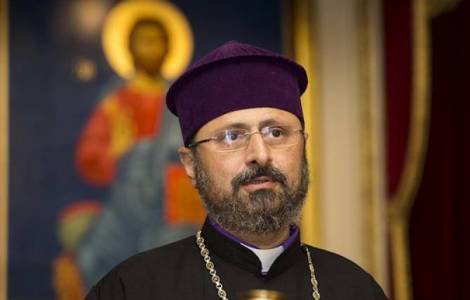ASIA/TURKEY – The Armenian Patriarch of Constantinople blesses the process of normalization of relations between Armenia and Turkey
armenpress.ar
Istanbul (Agenzia Fides) – The ongoing process of calming and normalizing relations between Turkey and Armenia is supported with determination and hope by the authorized representatives of the Armenian community on Turkish soil, starting with the Armenian Apostolic Patriarch of Constantinople, Sahag Mashalyan. The leader of the Armenian community in Turkey described as “valuable” the measures “which strengthen relations between neighboring countries, both in terms of investments and cultural exchanges”. For Turkish citizens who belong to the Armenian Church – added the Patriarch in the statements revived by the national press – “it is also extremely important that relations improve day by day so that the two communities get to know each other , work together, invest and in this sense, rich cultural values meet on common ground”.
Relations between Turkey and Armenia, plagued by the absence of a shared memory regarding the horrific events of the Armenian Genocide, recorded a turning point after the armed conflict between Armenia and Azerbaijan, which in 2020 returned inflame the Caucasus in a new, bloody phase of the historic dispute over Nagorno-Karabakh, an Armenian-majority region now included within the borders of Azerbaijan. The signing of the ceasefire, which took place on November 9, 2020 with the mediation of Russia, saw the clear affirmation of the Baku army, and ended six weeks of fierce fighting between the troops Azerbaijani and Armenian women sent from Yerevan. It provided for the withdrawal of Armenian military forces from Azerbaijani territory, the return of displaced persons to their respective areas of residence and the deployment of Russian troops as “peacekeepers” in Nagorno-Karabakh for the next 5 years.
In Armenia, the end of the conflict, perceived as a defeat, triggered a heavy political crisis: the process of normalizing relations between Armenia and Turkey got under way on the developments of this uncertain phase, also favored by the pressure exerted by Russia on Vladimir Putin, who continues to act as an energetic “mediator” between Yerevan and Ankara. Diplomatic relations between Turkey and Armenia have been frozen since 1993, when the Turks closed the border with the former Soviet republic precisely because of the Armenian-Azerbaijani conflict over Nagorno-Karabakh, a conflict that has always seen the Turkish government firmly on the side of Azerbaijan. . However, the first Turkish-Armenian bilateral meeting aimed at easing relations took place on January 14 in Moscow, in an atmosphere described as “constructive” by official Armenian sources. In the Russian capital, the Speaker of the Armenian Parliament, Ruben Rubinyan, met with Turkish Ambassador Serdar Kilic, exchanging “preliminary views on the process of normalizing dialogue between Armenia and Turkey”. The parties have agreed to continue negotiations without preconditions. After the meeting in Moscow, Mevlüt Çavuşoğlu, Minister of Foreign Affairs of Turkey, also reiterated that the objective of the negotiations started is “complete normalization”, adding that “even the Armenians are very satisfied with it”. Turkey is also interested in the reopening of international flights between the two countries, scheduled for early February.
In addition to the statements of Patriarch Mashalyan, the Turkish daily Hürriyet also published the statements of the Armenian entrepreneur Dikran Gülmezgil, chairman of the school board of the Karagözyan Foundation, according to which from now on Turkey “should act as the elder brother of Armenia”. , while Yetvart Dantzikian, director of the bilingual Turkish-Armenian newspaper Agos, said he viewed the reopening of borders between the two countries with optimism. (GV) (Agenzia Fides, 01/22/2022)
To share:

